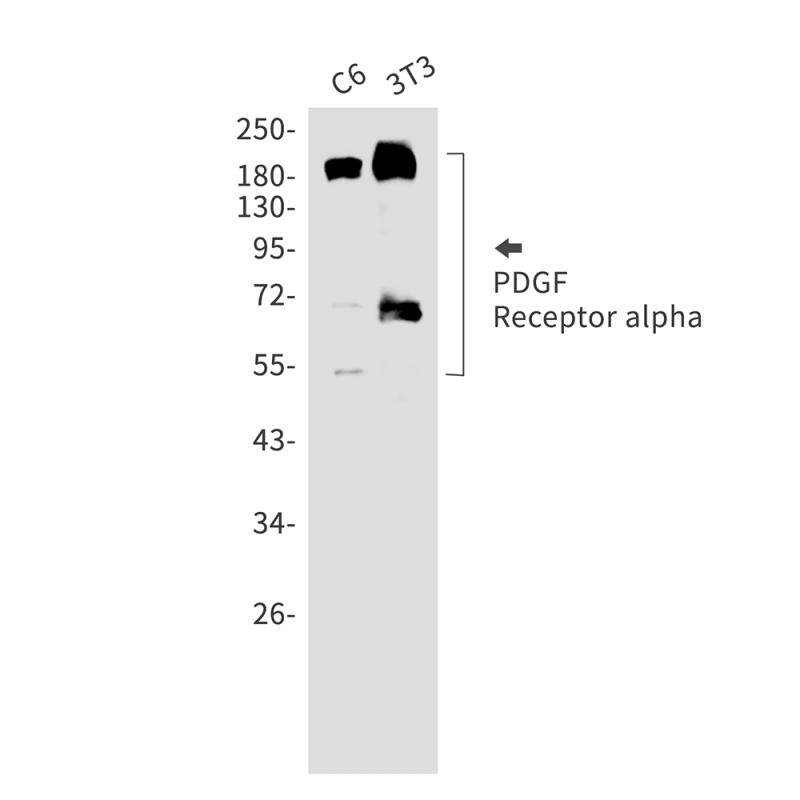
| WB | 1/500-1/1000 | Human,Mouse,Rat |
| IF | 咨询技术 | Human,Mouse,Rat |
| IHC | 咨询技术 | Human,Mouse,Rat |
| ICC | 技术咨询 | Human,Mouse,Rat |
| FCM | 咨询技术 | Human,Mouse,Rat |
| Elisa | 咨询技术 | Human,Mouse,Rat |
| Aliases | PDGFRA; PDGFR2; RHEPDGFRA; Platelet-derived growth factor receptor alpha; PDGF-R-alpha; PDGFR-alpha; Alpha platelet-derived growth factor receptor; Alpha-type platelet-derived growth factor receptor; CD140 antigen-like family member A; CD140a antigen; Platelet-derived growth factor alpha receptor; Platelet-derived growth factor receptor 2; PDGFR-2; CD140a |
| Entrez GeneID | 5156 |
| WB Predicted band size | Calculated MW: 123 kDa; Observed MW: 190 kDa |
| Host/Isotype | Rabbit IgG |
| Antibody Type | Primary antibody |
| Storage | Store at 4°C short term. Aliquot and store at -20°C long term. Avoid freeze/thaw cycles. |
| Species Reactivity | Human,Mouse,Rat |
| Immunogen | A synthetic peptide of human PDGF Receptor alpha |
| Formulation | Purified antibody in TBS with 0.05% sodium azide,0.05%BSA and 50% glycerol. |
+ +
以下是关于PDGFRα抗体的3篇代表性文献示例(注:文献为示例性质,具体内容请以实际论文为准):
---
1. **文献名称**:*Targeting PDGFRα in Glioblastoma with a Novel Monoclonal Antibody*
**作者**:Smith, J.D. et al.
**摘要**:本研究开发了一种新型抗PDGFRα单克隆抗体,通过体外实验和小鼠模型证明其能有效抑制胶质母细胞瘤细胞的增殖和侵袭,并阻断下游PI3K/AKT信号通路,为靶向治疗提供新策略。
---
2. **文献名称**:*PDGFRα Antibody Therapy Attenuates Pulmonary Fibrosis in Mice*
**作者**:Aono, Y. et al.
**摘要**:研究利用抗PDGFRα抗体干预博来霉素诱导的小鼠肺纤维化模型,结果显示抗体治疗显著减少胶原沉积和炎症细胞浸润,提示PDGFRα靶向治疗在纤维化疾病中的潜力。
---
3. **文献名称**:*Diagnostic and Prognostic Value of PDGFRα Expression in Gastrointestinal Stromal Tumors*
**作者**:Heinrich, M.C. et al.
**摘要**:通过免疫组化分析PDGFRα在胃肠道间质瘤(GIST)中的表达,发现其与特定基因突变(如D842V)相关,高表达患者预后较差,支持其作为诊断标志物和治疗靶点。
---
如需具体文献,建议通过PubMed或Google Scholar检索关键词(如“PDGFRα antibody therapy”、“PDGFRα monoclonal antibody”)获取最新研究。
Platelet-derived growth factor receptor alpha (PDGFRα) is a transmembrane tyrosine kinase receptor that plays a critical role in cell proliferation, migration, differentiation, and tissue development. It binds to PDGF ligands (e.g., PDGF-AA, PDGF-BB), leading to receptor dimerization, autophosphorylation, and activation of downstream signaling pathways such as MAPK, PI3K/AKT, and JAK/STAT. PDGFRα is essential in embryogenesis, organogenesis, and maintaining stromal tissue homeostasis. Dysregulation of PDGFRα signaling, through mutations, overexpression, or autocrine activation, is implicated in cancers (e.g., glioblastoma, gastrointestinal stromal tumors), fibrosis, and atherosclerosis.
PDGFRα antibodies are essential tools for detecting and studying the expression, localization, and activation status of this receptor in research and diagnostics. These antibodies are widely used in techniques like Western blotting, immunohistochemistry (IHC), immunofluorescence (IF), and flow cytometry. In cancer research, they help assess PDGFRα overexpression as a prognostic marker or therapeutic target. Therapeutic PDGFRα-targeting antibodies or inhibitors are being explored to block aberrant signaling in malignancies and fibrotic diseases. Notably, some tyrosine kinase inhibitors (e.g., imatinib) and monoclonal antibodies (e.g., olaratumab) have shown clinical potential, though efficacy varies across conditions.
Overall, PDGFRα antibodies remain pivotal in advancing mechanistic insights and therapeutic strategies for diseases linked to PDGFRα dysregulation.
×